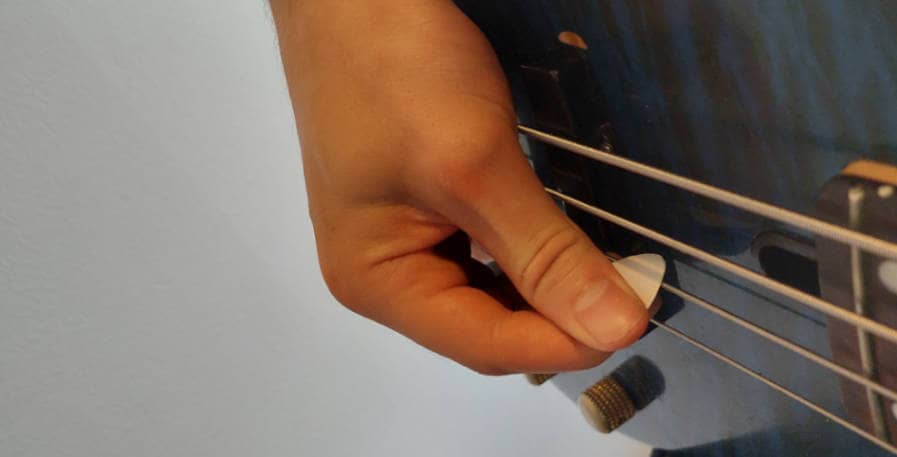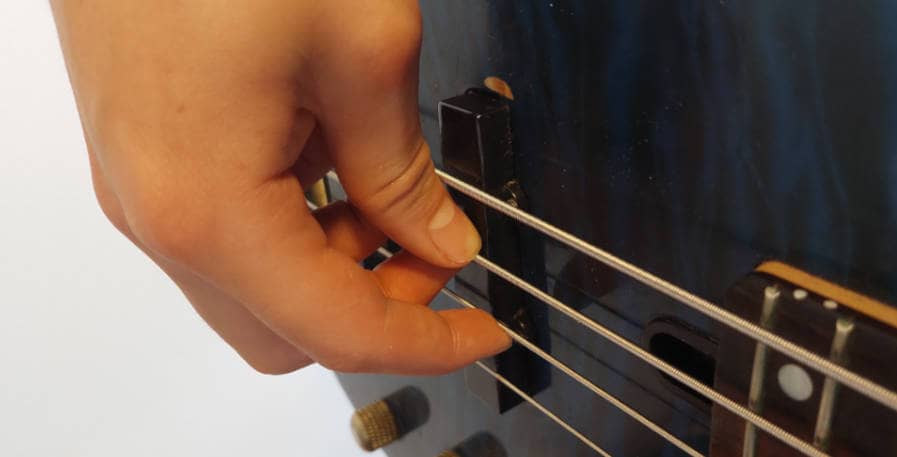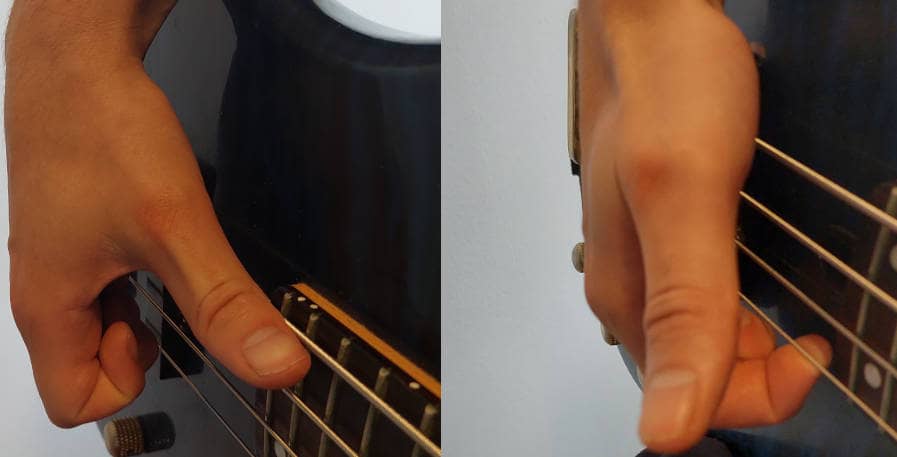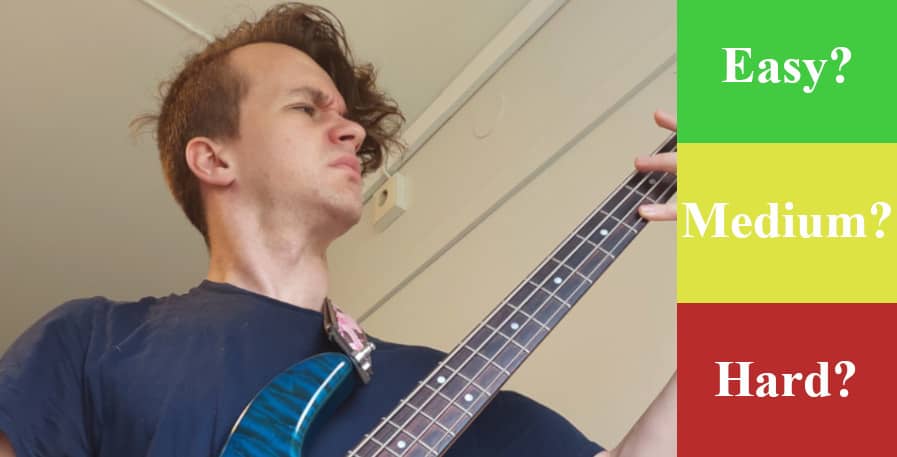After 15 years of playing bass, I`ve met my fair share of people who think the instrument looks easy. I`ve also run into people who thought playing such a big instrument looked challenging. So were either of these groups right, and is the bass guitar easy or hard to play?
Compared to other common instruments, the bass guitar is relatively easy to learn and play adequately at a beginner level. However, at an intermediate and professional level, the bass guitar is a challenging instrument that requires years of consistent practice to play well.
In other words, the difficulty of the instrument increases as you develop as a bass player.
Therefore, I decided to write this guide for anyone who is looking to pick up the bass, or already has done so, and is wondering about how challenging it is going to get.
Below is the full scope of what makes the bass a beginner-friendly instrument, and why it gets harder to play with time. I will compare what techniques and aspects of playing bass are the most difficult, and how this can depend on what genre of music you play.
Then, you`ll learn about whether it is difficult to write bass lines, set your tone and EQ, and play in a band. Since it is a common comparison, I`ll also compare the difficulty of the bass to the electric guitar.
What makes the bass hard to play?
There is a lot that goes into playing the bass well. Many of these skills are easy to pick up, but hard to master. Others are challenging from the get-go, and some are easy for beginners and professionals alike.
Thus, I made a table of the different skills a bassist needs to master, and how challenging they are at a beginner and advanced level.
While I still have a lot to learn, I have put years of practice into all of these skills. Thus, while this list is based on real-life experience, keep in mind that different people will find different techniques difficult. This is merely based on how I experienced the learning curve of the instrument:
| Required skill to play the bass: | Difficulty at a basic level: | Difficulty at an advanced level: |
| Playing the bass | Easy | Hard |
| Playing bass with a band | Medium | Hard |
| Bridging rhythm and harmony: | Medium-hard | Hard |
| Adjusting tone | Easy-medium | Medium-hard |
| Muting Strings | Medium | Medium |
| Writing bass lines | Easy | Hard |
| Memorizing the fretboard | Easy-medium | Easy |
| Fretting and hand movement | Medium | Medium |
| Understanding music theory | Medium | Medium |
| Playing with feel and articulation | Hard | Hard |
| Playing chords | Medium | Medium |
| Finger strength and flexibility | Medium | Easy |
| Plucking strings with the fingers | Medium | Hard |
| Playing with a pick | Easy-medium | Medium-hard |
| Slapping the bass | Medium-hard | Hard |
Some of these skills are ranked as equally hard, or even easier at an advanced level.
This is because while they require practice and studying as a beginner, they tend to become second nature after playing for several years. Thus, if you master these skills early, they will often not be as demanding later on.
How hard is bass compared to guitar?
While the bass and guitar are similar instruments in how they are played, they require a vastly different set of skills.
People often choose to play bass over guitar because it is an easier instrument to pick up. This is because for a beginner, switching between chords and strumming multiple strings on the guitar is harder than playing 1 note at a time on the bass.
However, at an advanced level, the bass is arguably more difficult to master than the guitar.
Playing the guitar at a high level requires technical proficiency. Genres like rock and jazz also require you to play with a lot of feel to be a great guitarist.
As an advanced bassist, you also need to be technical, though this is only a part of what makes a great bass player. What sets advanced bassists apart from beginners is their ability to make a band sound connected, as well as write and play grooves that fit the song well.
“This was like the beginnings of me learning about feel and the importance of how things sit in a song and stuff like that. It took me a long time to, you know, really wrap my mind around the part where these guys are only playing 3 notes, but this song grooves so hard”
Thundercat on “Lady” by DÀngelo – 2020 Interview with Pitchfork
Thus, playing the bass can make you a better guitarist, as it will give you a better idea of how to groove, as well as how to sound more cohesive. However, you might struggle to play fast leads and chords as these require a different skill set than on the bass.
Likewise, playing the guitar can make you a better bassist. Playing bass lines can feel easy because they consist of single notes instead of chords, and basslines rarely consist of complex leads. What guitarists switching to bass often lack is groove and articulation, as there is much less of an emphasis on this on the 6-string.
Thus, despite their similarities, the bass and guitar are completely different instruments. The bass is more beginner-friendly, but at an intermediate and advanced level, I`ve personally found it to be more challenging than the guitar.
Plucking styles
There are 3 main ways to pluck strings on the bass guitar: Playing them with your fingers, slapping them with your thumb, or plucking them with a pick.
All three of these styles have their own challenges, and vary in how beginner-friendly they are. Here are the main differences between them in terms of difficulty.
Pick:

Playing with a pick is a beginner-friendly way to play the bass. This is because it is easier to control the speed of your picking both during slow and medium-tempo songs.
You will be able to pick strings fast from the get-go. Therefore, practicing with a pick is more centered around controlling your picking, rather than building up your speed. Playing with a pick is thus the fastest way to become good at picking strings fast.
Quickly switching between what strings you are picking can however be harder with a pick than with your fingers or when slapping. Personally, I also find it much easier to control the articulation of my plucking when playing with my fingers, rather than with a pick.
Fingers:

Plucking strings with your fingers is moderately difficult for a beginner.
Slow bass lines are generally undemanding, but it can be hard to control the tempo and speed of your plucking when playing fast lines. It will also take months of practice to be able to gradually build up the speed of your fingers.
Once you have developed your speed though, playing with your fingers is a great technique for jumping across strings. Thus, it is a great technique for playing basslines with a lot of movement and makes these a lot easier to play.
When you have developed your speed and control, the next step is to play with feel and articulate notes with varying degrees of intensity. Playing with your fingers is great for this, but it is a difficult skill that takes years to become great at.
Slapping and popping:

Slapping is a difficult way to play the bass, both as a beginner and intermediate player.
It takes a lot of practice to develop the control and speed of your thumb when it is used for slapping. Slapping is also often used in conjunction with popping, which is another skill that is often hard for beginners.
Thus, developing control of both techniques simultaneously is harder and more time-consuming than playing with a pick or with your fingers. Due to how hard strings are plucked, it is also more demanding to control the articulation of your playing.
At an advanced level, slapping enables you to play some insanely fast and funky basslines. At this level, the challenge often lies in playing technically demanding lines, while simultaneously grooving with the other members of a band.
Slapping is a type that can be applied at a beginner level after a couple of months of practice. Thus, while not overly difficult, the style has a higher barrier of entry than playing with a pick or with your fingers.
Tone and effects
Bassists are obsessive about the tone of their instruments. While this obsession can seem excessive, setting the tone is actually a critical and difficult part of playing the bass.
This is because the tone of a bass sets the mood of a song, often more so than the melody of the bassline itself. Thus, failing to set a fitting bass tone, or understanding what type of tone fits a song can make or break the feel of the whole composition.
At a basic level, bassists can do this by turning the tone knob up or down. This knob adjusts the treble. Turning it up makes the tone brighter, which can be more fitting for aggressive, fast, or upbeat songs. Dialing it down leads to a muskier tone that is generally more fitting for heart-felt, smooth, and slow songs.
The tone can be further adjusted through mid-range and low-end EQ, or by blending the pickups if you have an active bass.
The low-end can be turned up for a boomy tone that takes up a lot of space. The mid-range can be turned up for a more pronounced and metallic tone. The bridge pickup can be turned up for a sharp tone, while the neck pickup has a smooth tone when turned up.
On top of all of that, there are all kinds of effect pedals that can be used to further change the tone of the bass. Compression, chorus, distortion, overdrive, and delay are just some of the effects that bassists commonly use when a song calls for it.
Thus, developing an understanding of EQ and effects takes time and effort. It also requires you to actively listen for how it all affects both your own tone and the sound of your band.
Genres
Playing the bass proficiently is difficult in every genre of music. Where genres differ, is in what skills are the most crucial for a bass player.
Thus, here is a list of the most common genres of music, and what I felt were the most important skills when I gave them a try.
| Genre of music: | Main skills of a bass player: |
| Rock | Locking in with the drummer, adaptability |
| Pop | Tone, adaptability |
| Jazz | Articulation, Feel, Theoretical knowledge |
| Metal | Speed, Tone |
| Punk | Speed |
| Funk | Groove, Slapping, bridging rhythm and melody |
| Hip-hop | Feel, Tone, Adaptability |
| Classical | Theoretical Knowledge, Articulation |
| Blues | Theoretical knowledge, Feel |
| Country | Articulation, Locking-in with the drummer |
| Indie/Alt Rock | Tone, Writing basslines |
| Soul / Motown | Feel, Articulation |
| Reggae | Feel, Tone |
| Disco | Groove, Feel, Tone |
Muting strings
Muting means dampening unplayed strings so they don’t resonate and produce unwanted noise. Due to the low-frequency range of the bass, unmuted strings will make your sound muddy in addition to often sounding disharmonic.
Thus, a big part of playing the bass consists of keeping unplayed strings muted.
Thus, when progressing from simple 8th-note grooves to melodic bass lines, bassists commonly struggle to produce a clean tone. This is because keeping strings muted becomes significantly harder when constantly moving between strings.
To keep strings muted, bass players can use both their left and right hand. A common way to do this is by muting strings with the thumb, or with the palm of their plucking hand.
It takes time to develop sufficient control to do this well. Thus, as bass players progress from the basics stages, keeping strings muted is an essential skill that has to be learned, and one that is moderately difficult.
Playing bass in a band
“Being a bass player in these big-time rock bands is hard work.”
Michael Anthony – Bass Player for Van Halen
Bass might be the easiest instrument to pick up and play adequately in a band. With that said, I also consider the bass to be the most difficult instrument to play in a band at a high level.
The reason it`s easy to pick up is that many basslines are fairly straightforward. Thus, as long as you can stay on time and play some basic grooves, you can play in a band.
However, while advanced bassists still often play simple grooves, there is a lot that goes into playing them.
First off, they had to come up with the bass line. They considered what type of bass line would be best for the song in question, tried out different variations, and put their ego aside if it was required of them.
Thus, even the simplest bass lines are often well-thought-out and meticulous.
Furthermore, experienced bassists always listen to what the other members of the band are doing. With that, they adapt their timing, feel and tone to the other musicians.

The best of the best take it a step further. They are not only able to listen to how every other instrument sounds with the bass, but also how they sound with one another.
When the number of instruments exceeds 3, this creates a web of musical relationships.

As the number of members in a band increases, this web also increases exponentially in size.
| Instruments in a band: | Amount of relationships between instruments: |
| 1 | 0 |
| 2 | 1 |
| 3 | 3 |
| 4 | 6 |
| 5 | 10 |
| 6 | 15 |
| 7 | 21 |
| 8 | 28 |
| 9 | 36 |
| 10 | 45 |
A good bass player will adjust to all the members of a band to make them sound cohesive. They will also write basslines that work well with every instrument.
Thus, the more members there are in a band, the more challenging this can be to a bassist who understands the importance of connecting the band.
Writing bass lines
It is possible to write great and fitting basslines to a song with a basic understanding of, rhythm, harmony, and chords.
However, understanding what type of bass lines will serve a song the best is a skill that takes years to develop. It is also a skill that great bassists continue developing throughout their careers.
What separates great bassists from beginners, is that they understand when to keep things simple, and why simple lines work. They can also tell when a song calls for a more complex groove, and have the technical proficiency to play difficult grooves while still sounding smooth.
Being able to do this well, can only be learned through experience. I, like many other bassists, went through both extremes of this. In my first couple of bands, I wanted to sound like Geddy Lee, and I tried playing complex lines. In hindsight, this did more harm than good to the songs.
Then, when I realized my mistake I dialed it back way too much and only played the simplest of lines. As a result, my playing sounded plain and uninspired, even though this was a better approach than over-complicating things.
It took about 4-5 years of playing before I found a good middle ground. Nowadays, I look for ways to make the songs more interesting by adding melody and groovy elements to my basslines. If it suits the song it will add a lot of flavor to it, and if it doesn`t I know when to dial it back instead.
Thus, writing great basslines is a difficult part of playing the bass which can only be properly learned through experience.
Lessons and resources
Bass lessons are not a requirement to learn the bass guitar. They will however help you improve faster, and avoid common beginner mistakes. Thus, for anyone who is serious about becoming proficient at the instrument bass lessons tend to be worth it.
Taking lessons also makes it easier to learn the bass guitar. This is because a good tutor or online course tailors the learning material to your needs. As a result, the learning process feels less overwhelming and enables you to iron out weaknesses in your technique.
When I took lessons, my tutor put a lot of emphasis on finger exercises and honing down my left-hand technique. Being self-taught for years at that point, I was not even aware that my fretting hand position was a weak point in my technique. Thus, I had to relearn some basics, many years into my journey as a bass player.
While it was tedious to relearn the basics, it was also extremely helpful. By focusing on my weaknesses, I also improved at the bass faster than I had done in years.
Furthermore, it would have been even more beneficial if I had taken lessons from the get-go. This is the main reason I recommend lessons for serious beginners, as well as intermediate bassists.
What`s best of all, is that the exercises you do in lessons are never overly difficult. Well-tailored lessons will push your ability, but they are never “hard” to the point where you have to spend months mastering exercises. Thus, lessons are a great way to diminish the difficulty of learning the bass guitar.
Conclusion
Overall, the bass guitar is not an easy instrument.
It is however beginner-friendly and, it`s easier to pick up the bass than the piano, guitar, or violin. When moving past the beginner stage, the instrument requires a solid technique, overall musical understanding, and adaptability.
Thus, for anyone who wants to play an instrument with a low barrier of entry and is discouraged by the idea of practicing for months before they can even play simple songs, the bass is a good choice.
For anyone who is looking to become a proficient, serious, or professional musician, the bass guitar will not be an easy instrument for this purpose.
The instrument is made easier by taking lessons and developing a solid technique from day one. Actively listening to music and thinking about why great bass lines work as well as they do also does wonders for how quickly you develop as a bass player.
The instrument becomes harder to play if you don`t diversify your playstyle and tone, and by not actively listening to the other members of a band.
If you don`t know what types of basslines you could be playing, or how to play them, it is difficult to write fitting basslines for a band. Without knowing how to set your tone to fit a song, it is hard to make your band sound like you want it to. While a basic understanding of these concepts will get you by as a beginner, they are also skills that need to be developed as you move to an intermediate level.
Thus, playing the bass is a challenging job that carries a lot of responsibility with it. It is also incredibly fun, fulfilling, and an amazing creative outlet, that I recommend to anyone who is intrigued by the instrument.
If you are still on the fence about whether the bass guitar is the right instrument for you, check out my guide on whether you should play the bass guitar.

